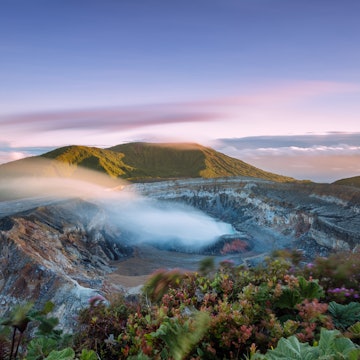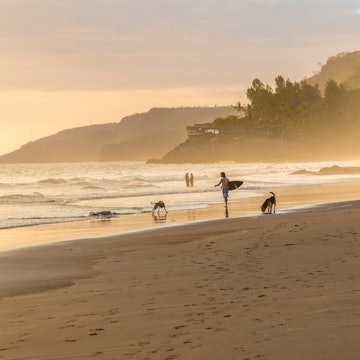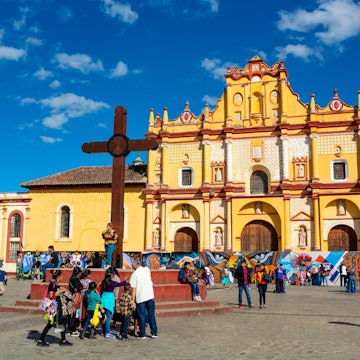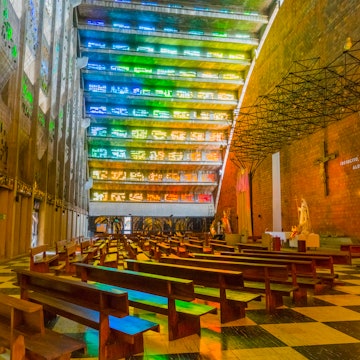
5 of the most thrilling volcano adventures in Central America

Oct 8, 2025 • 3 min read

Volcán Rincón de la Vieja in Costa Rica. Leo.leonc/Shutterstock
Once considered a gateway to hell, the Central America Volcanic Arc is now a playground for adrenaline junkies and volcano enthusiasts from around the world.
The mix of dormant and occasionally active volcanoes that make up the spine of the Central America isthmus is home to a diverse landscape that provides the perfect backdrop to a variety of volcano adventures. Whether you tackle several volcanoes on a single trip or take them on one by one, these five volcanoes in Central America are ready for adventurers to explore.

1. Hiking the Santa Ana Volcano in El Salvador
The Santa Ana Volcano, also known as Ilamatepec, is the highest volcano in El Salvador. Standing at 7812ft above sea level, it’s the third-highest point in the country, and it's located less than an hour from the capital city of San Salvador. Santa Ana's crater is one of the largest in the world. The last eruption happened in 2005. Guided tours are mandatory for a popular four-hour hike to the summit that offers stunning views of Lake Coatepeque and the Pacific Ocean.

2. Relaxing at Volcán Rincón de la Vieja in Costa Rica
Situated in a 54 sq mil national park, the expansive Volcán Rincón de la Vieja, which translates to "old lady’s nook," is an hour and a half from the town of Liberia. Eruptions in 2021 have closed off hikes to the 6217ft summit, there are shorter hiking loops around the park and to other peaks in the region, such as Volcán Santa María, which measures 6286ft.
But why hike when you can relax? A collection of thermal springs, long thought to have healing properties, are spread throughout the park with many requiring no serious hiking to reach them at all. Tours to the national park and hot springs are offered by many Liberia-based companies.

3. Birdwatching at Barú Volcano in Panama
Barú Volcano is Panama's highest peak at 11,398ft. Located in the Chiriqui Highlands, the dormant volcano and its seven craters are a birdwatching paradise. About 250 species of birds call Parque Nacional Volcán Barú home, including the elusive quetzal.
Two routes lead to the volcano’s summit. The path that leaves Boquete is the easier route, though it's still very strenuous and can take five to six hours from the park gate to the summit. The other route leaves from the town of Volcán and is suitable for experienced mountaineers only.
The trek takes 10 to 12 hours. A popular option for experienced hikers is to start a guided ascent at night so that you arrive at dawn and enjoy stunning views at sunrise. The dry season (January to April) is the best time to go.

4. Volcano surfing at Cerro Negro in Nicaragua
Just 160 years old, Cerro Negro is the youngest volcano in Central America. Reaching heights of 2388ft, the Nicaraguan volcano located just outside of León is one of the most active in the region. But that hasn’t stopped a growing subset of people from hopping on specially designed boards and speeding down the black gravel slopes.
Volcano surfing (or volcano boarding) is exactly what it sounds like, trading out the water for rocks and ocean spray for plumes of ash. It’s a perfect combination of pure joy and what most parents would call complete stupidity. Several agencies in the area offer tours to hike and surf the volcano.

5. Witnessing an active volcano in Guatemala
For the real-deal volcano experience that includes fresh lava and smoking sulfur, Pacaya in Guatemala is the spot. Though Pacaya is known as one of Central America’s most active volcanoes, the typical small eruptions of ash don’t pose a threat to visitors. In fact, various hiking tours offer the chance to roast marshmallows on the heat emanating off the volcanic rock.
Pacaya is 8373ft tall and about a 1.5-hour drive from Antigua. A hike to the summit takes about two hours and offers views of Agua and Lago de Atitlán. If you're really not in a mood for a hike, you can rent horses on the way up.













